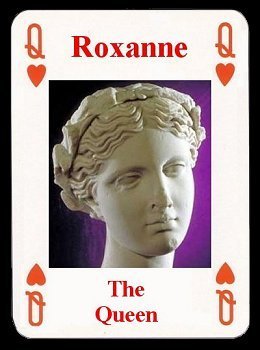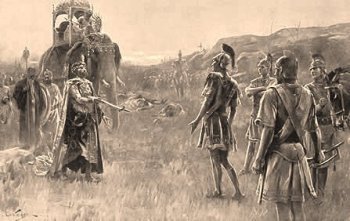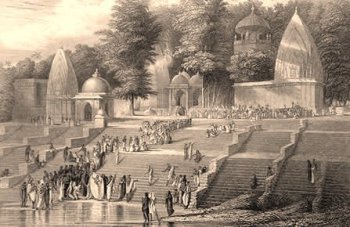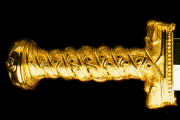
India was a place of mystery to Europeans and to most Persians too, and Roxanne seems to have become enthralled by this exotic land. She was excited by plants and animals she had never seen, captivated by the local customs and intrigued by the Hindu religion. In 326 BC, as Alexander’s army moved along the Indus Valley, Roxanne was able to visit a number of Hindu temples and shrines. Alexander’s biographers reveal that Roxanne seems to have understood more about the native religion than Alexander’s own court scribes.

During one of the
last skirmishes of the Bactrian campaign, Roxanne was captured
by the Macedonian army. The sixteen-year-old daughter of an Afghan
chieftain, she is said to have been beautiful, intelligent and vivacious.
Alexander appears to have fallen madly in love with her because he married
her almost at once. From all accounts, the feelings were mutual.
There was certainly no political reason for the marriage as Roxanne’s father
was a minor figure of no real importance.
The Indian king Puru surrenders to AlexanderPuru in the summer of 326 BC.
(Mary Evans Picture Library)
(Mary Evans Picture Library)

Right: One of the
splendid Indian temples that so enthralled Roxanne.
(Mary Evans Picture Library)
(Mary Evans Picture Library)
When Alexander returned
to Iran in 324 BC, he took a second wife, Statira, the
daughter of the dead Persian king Darius III. This
marriage may well have been political, but how did it effect Roxanne? Could
it have changed the endearing and seemingly spiritual-minded girl to such an extent that she killed
her husband for betraying their love and taking another wife?
In 327 BC the war with
Persia was over and all of its once mighty empire was now under Alexander’s
control. With this added to his homeland of Macedonia, its adjacent
countries and the Greek states, Alexander now ruled the largest empire the
world had ever known. It should have been time to return home and call
it a day, but Alexander decided to push on into India (see >map).









